France/Ambassador/Libya
(Ambassador to Libya) | |
|---|---|
 Francois Gouyette was ambassador during the regime change in 2011. | |
| Start | 1952 |
| The French ambassador to Libya | |
The French Ambassador to Libya is France's highest diplomatic representative to Libya.
Contents
History
Early arms sales
Libya developed particularly close relations with France after the June 1967 War, when France relaxed its arms embargo on nonfront-line Middle East combatants and agreed to sell weapons to the Libyans, such as the Mirage 5 aircraft. In 1974 Libya and France signed an agreement whereby Libya exchanged a guaranteed oil supply for technical assistance and financial cooperation.
By 1976, however, Libya began criticizing France as an "arms merchant", because of its willingness to sell weapons to both Israel and the Arab countries.
Libya was also dissatisfied with French military intervention in the Western Sahara, Chad, and Zaire. In 1978, Muammar Gaddafi noted that although economic relations were good, political relations were not. He accused France of having reverted to a colonialist policy, which former French president Charles de Gaulle had earlier abandoned.[1]
Chadian Civil War
In the 1980s, Libyan-French discord centered on the situation in Chad. The two countries found themselves supporting opposite sides in the Chadian Civil War (1965-1979). The Chadian Armed Forces were formed by Chadian veterans of the French colonial military, and continued to receive training and equipment from France. The initial rebellion erupted in opposition to the French-supported Chadian President François Tombalbaye, whose government was marked by authoritarianism, extreme corruption, and favoritism.
In late 1987, there were 1,300 French troops in Chad, primarily defending the Chadian capital N'DJamena from attack, including an air attack using Tupolev Tu-22 strategic bombers; France also gave $90 million in military aid to Chad that year.".[2] However, French policy did not permit its forces to cross the sixteenth parallel. Thus, direct clashes with Libyan soldiers seemed unlikely. However, Libyan diplomats still accused France of having "direct responsibility" in the escalation of the war, and the Libyan news agency JANA called the raid a "combined Franco-American military action" and charged that Washington and Paris were "behind the aggression against Libya."[2]
UTA Flight 772
- Full article: UTA Flight 772
- Full article: UTA Flight 772
French-Libyan relations deteriorated substantially in the aftermath of the 1989 UTA Flight 772 bombing. On 19 September 1989, a McDonnell Douglas DC-10 airliner operated by French airline UTA (Union de Transports Aeriens) as UTA Flight 772, was destroyed by a bomb in the cargo hold, killing all 170 passengers and crew (including 54 French nationals).
In a case very similar to the Lockebie bombing, Libya was blamed for political reasons, even though the real culprits were elsewhere. France blamed Libya for the attack. The cour d'assise de Paris found six Libyans guilty of the attack and awarded the families of the UTA victims sums ranging from €3 000 to €30 000 depending on their relationship to the dead.
2011 regime change
On 10 March 2011, France was the first country in the world to recognise the National Transitional Council, a French-supported proxy force, as the legitimate government of Libya. French warplanes also conducted the first military strikes against Gaddafi's forces to militarily aid the National Transitional Council.[3]
An Office Holder on Wikispooks
| Name | From | To | Description |
|---|---|---|---|
| Francois Gouyette | 17 December 2007 | 13 October 2011 | During the French-supported regime change |
References
- ↑ http://lcweb2.loc.gov/cgi-bin/query/r?frd/cstdy:@field(DOCID+ly0130)
- ↑ Jump up to: a b Greenwald, John (1987-09-21). "Disputes Raiders of the Armed Toyotas". Time.
- ↑ https://apps.dtic.mil/sti/citations/ADA624687